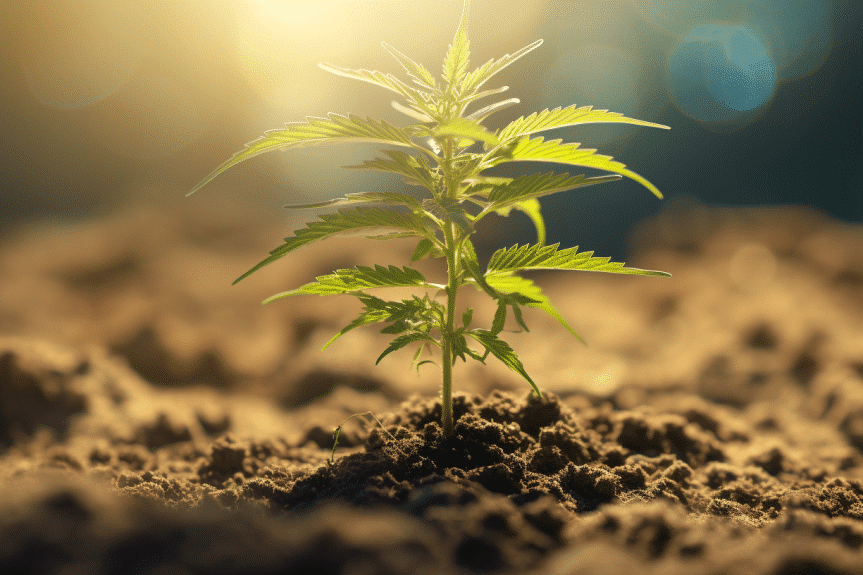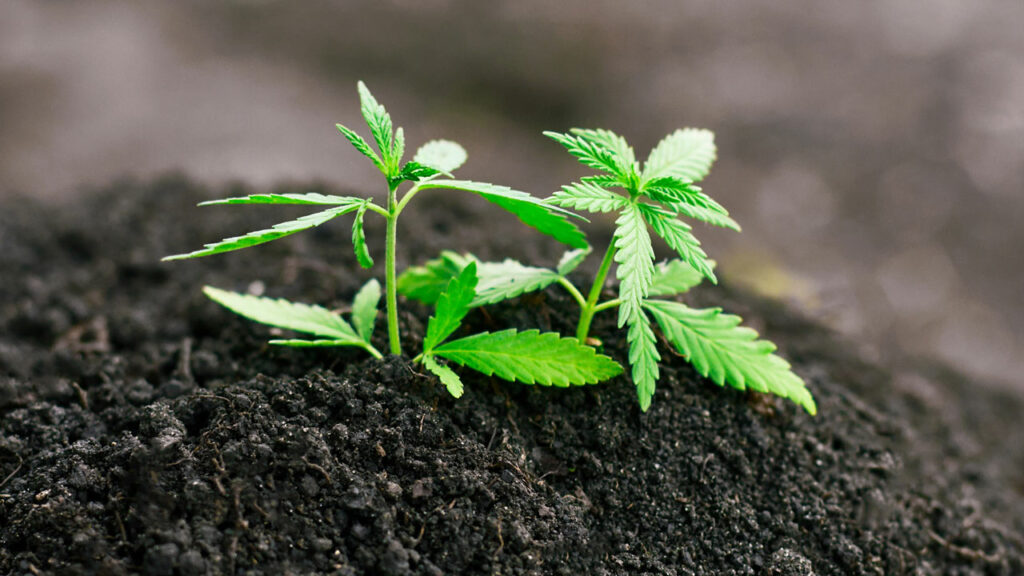Introduction
Choosing the best soil for growing cannabis is crucial for cultivating healthy plants and achieving robust yields. Cannabis, like any other plant, thrives when its roots have access to a nutrient-rich and well-balanced soil environment. In this guide, we’ll explore the characteristics of ideal soil for cannabis cultivation, factors to consider when choosing soil, and some recommended options that can help you achieve success in your grow.
Understanding Soil Requirements for Cannabis

Cannabis plants have specific soil requirements critical to their health and growth. Understanding these factors is essential for cultivators aiming to optimize their yield and plant quality.
1. Nutrient Content
Cannabis requires a balanced mix of essential nutrients throughout its lifecycle. Key nutrients include nitrogen (N), phosphorus (P), potassium (K), calcium (Ca), magnesium (Mg), and others. These nutrients play crucial roles in various stages of growth, from seedling development to flowering. Nitrogen supports leafy growth and overall vigor, phosphorus aids in root development and flower formation, while potassium enhances overall resilience and disease resistance.
2. Texture and Drainage
The texture of the soil is vital for cannabis root development. It should be loose and well-aerated to allow roots to penetrate easily and access oxygen. Good drainage is equally important to prevent waterlogging, which can lead to root suffocation and diseases such as root rot. Proper drainage ensures that excess water can escape, maintaining optimal soil moisture levels for healthy plant growth.
3. pH Level
Cannabis plants thrive in slightly acidic to neutral soils with a pH range typically between 6.0 and 7.0. pH levels outside this range can impact nutrient availability, leading to deficiencies or toxicities that hinder plant growth and development. Monitoring and adjusting soil pH as needed using organic amendments like lime or sulfur is crucial to maintaining optimal conditions for cannabis cultivation.
4. Organic Matter
Soil rich in organic matter provides numerous benefits to cannabis plants. Organic matter releases nutrients slowly over time, ensuring a steady supply that supports consistent growth. It also fosters beneficial microbial activity in the soil, which aids in nutrient uptake and promotes overall plant vigor. Microbes break down organic matter into simpler forms that are readily absorbed by roots, enhancing nutrient efficiency and reducing the need for external fertilizers.
In summary, choosing the right soil for cannabis cultivation involves ensuring a balanced nutrient profile, maintaining proper texture and drainage, monitoring pH levels, and incorporating organic matter. These factors collectively contribute to creating an optimal growing environment where cannabis plants can thrive and reach their full potential. By understanding and meeting these soil requirements, cultivators can enhance crop yields, improve plant health, and produce high-quality cannabis consistently.
Choosing the Best Soil for Cannabis
Choosing the right soil type is crucial for successful cannabis cultivation, as it directly impacts plant health and growth. Here are several options tailored to meet the diverse needs of cannabis growers:
1. All-Purpose Potting Mix
An all-purpose potting mix designed for both indoor and outdoor container gardening is an excellent choice for cannabis cultivation. These mixes are formulated to provide a balanced blend of essential nutrients and optimal drainage, crucial for healthy root development and overall plant vigor. Look for potting mixes specifically labeled for cannabis or vegetables, ensuring they contain adequate levels of nitrogen (N), phosphorus (P), potassium (K), and micronutrients essential for robust growth.
2. Organic Soil
Organic soils are crafted from composted materials and natural amendments, making them ideal for growers committed to organic practices. These soils offer a slow-release of nutrients, promoting sustained growth throughout the plant’s lifecycle. Rich in organic matter, they foster beneficial microbial activity in the soil, enhancing nutrient uptake and improving soil structure. Organic soil provides a natural and holistic approach to cultivating cannabis, ensuring plants receive essential nutrients in a balanced and sustainable manner.
3. Super Soil
Super soil is a pre-amended soil mix highly enriched with nutrients, often including organic additives like bat guano, worm castings, and bone meal. This nutrient-rich blend minimizes the need for additional fertilizers throughout the plant’s growth stages, providing a comprehensive solution for nutrient management. Super soil supports vigorous growth and robust flowering, making it a preferred choice among growers seeking high-yield harvests with minimal maintenance.
4. Coco Coir
Coco coir is a versatile growing medium derived from coconut husks, prized for its lightweight nature and excellent moisture retention capabilities. It offers superior aeration for roots, promoting healthy root development and reducing the risk of overwatering. Coco coir is commonly used in hydroponic systems and as a component in soil mixes to enhance drainage and nutrient uptake. Its sustainable and renewable properties make it an environmentally friendly choice for cannabis cultivation.
5. Soilless Mixes
Soilless mixes are composed of materials such as peat moss, perlite, and vermiculite, offering excellent drainage and aeration properties. While these mixes do not contain soil, they provide a sterile and inert medium that can be customized with precise nutrient supplementation. Soilless mixes are favored in hydroponic systems and for growers seeking precise control over nutrient levels and pH balance. Regular monitoring and supplementation of essential nutrients ensure optimal growth and yield in soilless cultivation.
Selecting the right soil type for cannabis cultivation depends on various factors such as growing environment, desired yield, and cultivation method. Whether opting for nutrient-rich organic soils, convenient all-purpose potting mixes, or specialized mediums like coco coir and soilless mixes, ensuring optimal soil conditions is essential for achieving healthy, thriving cannabis plants. By understanding the unique characteristics and benefits of each soil type, growers can tailor their cultivation approach to maximize plant health, yield, and overall success in cannabis cultivation.
Also Read: Essential Tips for Beginners in Outdoor Cannabis Cultivation
Tips for Soil Preparation and Management
Selecting the right soil is fundamental to successful cannabis cultivation. The soil serves as the foundation for plant health, influencing nutrient uptake, root development, and overall growth. Understanding the specific soil requirements of cannabis plants can help growers optimize their growing environment and achieve robust yields.
1. Amendments
Depending on your chosen soil type, consider adding amendments such as compost, perlite, or vermiculite to improve texture and nutrient retention. Compost enriches the soil with organic matter, improving nutrient availability and soil structure. Perlite and vermiculite enhance soil aeration and drainage, especially in heavier soils, promoting healthier root development and overall plant growth.
2. pH Testing
Regularly monitoring the pH of your soil using a pH meter or test kit is crucial for cannabis cultivation. Adjusting pH levels as needed using organic amendments ensures that nutrients are readily available to the plants. Adding lime raises pH levels, making nutrients more accessible, while sulfur lowers pH levels, preventing nutrient lockout and ensuring optimal nutrient uptake.
3. Watering
Proper watering practices are essential for cannabis plants. Water your plants thoroughly but allow the soil to dry slightly between watering to prevent overwatering, which can lead to root suffocation and diseases. Consistent watering habits maintain soil moisture levels that promote healthy root growth and nutrient uptake.
4. Mulching
Applying a layer of organic mulch, such as shredded leaves or straw, to the soil surface offers multiple benefits. Mulch conserves soil moisture by reducing evaporation, which is particularly beneficial in dry or hot climates. It suppresses weed growth, minimizing competition for nutrients and water. Additionally, organic mulch gradually decomposes, releasing nutrients back into the soil and improving soil structure over time.
Selecting and preparing the best soil for cannabis cultivation involves understanding and addressing these critical factors. By ensuring nutrient-rich soil with proper texture, drainage, pH levels, and organic matter content, growers can create an optimal growing environment for healthy, thriving cannabis plants. Implementing amendments, regular pH testing, appropriate watering techniques, and mulching practices are key steps towards achieving successful cannabis cultivation and maximizing crop yields.
Conclusion
Choosing the best soil for your cannabis plants is fundamental to their overall health and productivity. Whether you opt for a nutrient-rich organic soil, a specialized potting mix, or experiment with soilless options, understanding your plant’s needs and providing optimal growing conditions will ultimately determine your success. By investing in quality soil and implementing proper soil management practices, you can nurture robust cannabis plants from seedling to harvest, ensuring a rewarding and bountiful yield.
Now that you’ve explored the essentials of soil selection for cannabis cultivation, are you ready to start your own grow? Embrace the journey of nurturing these versatile plants and enjoy the satisfaction of cultivating cannabis in optimal soil conditions.

